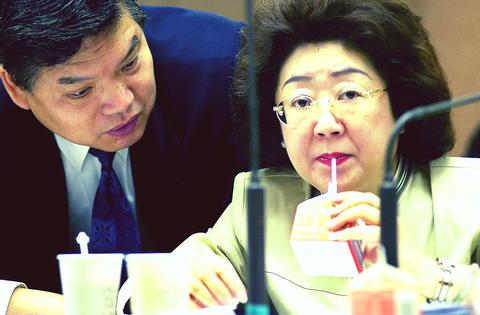Vice Minister of Education Fan Sun-lun (
She said that students should not be victimized due to partisan feuds in the Legislative Yuan.

PHOTO: LIAO RAY-SHANG, TAIPEI TIMES
Students stricken by hunger have been a much-talked-about subject since last month when Chinese-language media reported that more than 70,000 primary school students could not afford to pay for the lunch meals provided by schools, and schools could not offer any help either, because the subsidy was frozen by the legislature.
As there has been no development on the issue because of differing views between the ruling and opposition parties on the issue, Fan yesterday voiced her concern and called on the lawmakers to seek for a timely solution for the sake of students.
For this fiscal year, NT$433 million has been apportioned to local governments for the lunch meals of elementary students.
However, in accordance with a newly passed legislative resol-ution, the Executive branch must first gain approval from the legislature at a monthly meeting regarding how the funding will be used, so that the legislature can better monitor the executive departments.
Fan said because of this regulation, the budget earmarked for the lunch meal was rejected twice this year -- on March 27 and April 26 respectively, when the Directorate General of Budget, Accounting and Statistics (主計處), under the Executive Yuan, reported to the legislature because the opposition alliance disapproved part of the subsidies for local governments.
The vice minister stressed that her appeal was not meant to prompt partisan feuding, but was to prevent students from suffering because of political conflicts.
But Fan also dismissed media reports that students were stricken with hunger.
She said no students should be suffering from hunger nowadays because -- although being strapped for cash -- the local governments have managed to cover part of the fees for students who are from low-income families. And, along with the assistance from charity groups and faculty members at the schools, she said, no students should be afflicted by starvation.
Opposition lawmakers, however, did not consider it fair for them to shoulder the blame.
They accused the ruling administration of fault, and said that the DPP was spreading wrong information intended to mislead the general public.
"The budget bill was not sent to the legislature until March. How can we finish the reviewing process now?" said PFP lawmaker Diane Lee
DPP lawmakers said the opposition alliance was "opposed for the sake of opposing," and its request solely indicated how the legislative power had overridden the executive power.
"It is absolutely unreasonable for the Executive branches to report to the legislature every month in detail how its budget is used. By doing so, [opposition parties] just attempt to gain control of the authority to distribute financial resources," said DPP lawmaker Wang Li-ping (

US President Donald Trump yesterday announced sweeping "reciprocal tariffs" on US trading partners, including a 32 percent tax on goods from Taiwan that is set to take effect on Wednesday. At a Rose Garden event, Trump declared a 10 percent baseline tax on imports from all countries, with the White House saying it would take effect on Saturday. Countries with larger trade surpluses with the US would face higher duties beginning on Wednesday, including Taiwan (32 percent), China (34 percent), Japan (24 percent), South Korea (25 percent), Vietnam (46 percent) and Thailand (36 percent). Canada and Mexico, the two largest US trading

ACTION PLAN: Taiwan would expand procurement from the US and encourage more companies to invest in the US to deepen bilateral cooperation, Lai said The government would not impose reciprocal tariffs in retaliation against US levies, President William Lai (賴清德) said yesterday, as he announced five strategies to address the issue, including pledging to increase Taiwanese companies’ investments in the US. Lai has in the past few days met with administrative and national security officials, as well as representatives from various industries, to explore countermeasures after US President Donald Trump on Wednesday last week announced a 32 percent duty on Taiwanese imports. In a video released yesterday evening, Lai said that Taiwan would not retaliate against the US with higher tariffs and Taiwanese companies’ commitments to

‘SPECIAL CHANNEL’: Taipei’s most important tasks are to stabilize industries affected by Trump’s trade tariffs and keep negotiations with Washington open, a source said National Security Council Secretary-General Joseph Wu (吳釗燮) arrived in the US for talks with US President Donald Trump’s administration, a source familiar with the matter said on Friday. Wu was leading a delegation for a meeting known as the “special channel,” the Financial Times reported earlier. It marked Trump’s first use of the channel since returning to the White House on Jan. 20. Citing a source familiar with the matter, the Financial Times reported that Minister of Foreign Affairs Lin Chia-lung (林佳龍) was also a part of the delegation. The visit came days after China concluded war games around Taiwan and amid Trump’s

CHIP EXCEPTION: An official said that an exception for Taiwanese semiconductors would have a limited effect, as most are packaged in third nations before being sold The Executive Yuan yesterday decried US President Donald Trump’s 32 percent tariff on Taiwanese goods announced hours earlier as “unfair,” saying it would lodge a representation with Washington. The Cabinet in a statement described the pledged US tariffs, expected to take effect on Wednesday next week, as “deeply unreasonable” and “highly regrettable.” Cabinet spokeswoman Michelle Lee (李慧芝) said that the government would “lodge a solemn representation” with the US Trade Representative and continue negotiating with Washington to “ensure the interests of our nation and industries.” Trump at a news conference in Washington on Wednesday announced a 10 percent baseline tariff on most goods